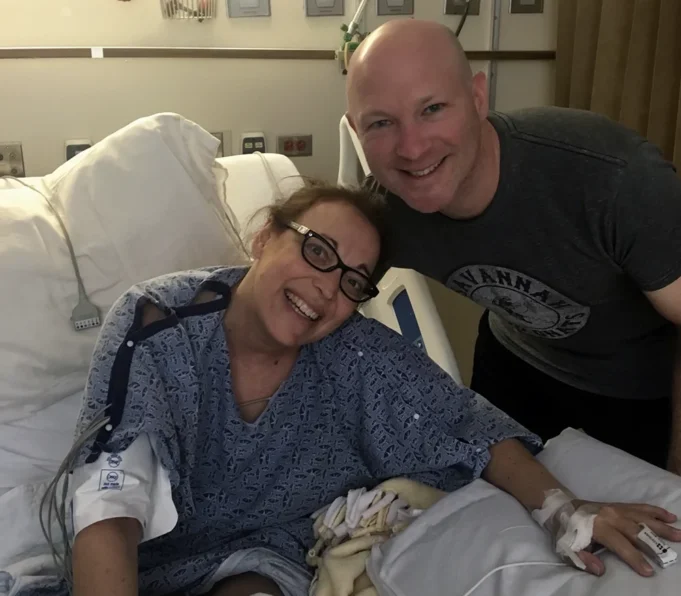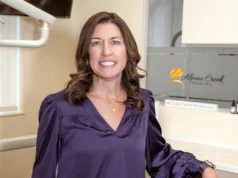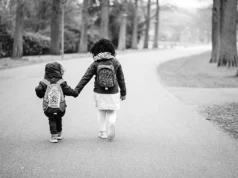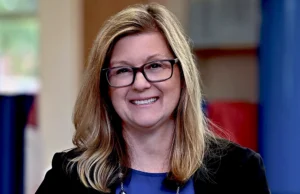Organ donation saves lives daily, as Amy Kilner and John Hickey know first hand
BY VALERIE HARDY
March holds National Awkward Moments Day and April National Read a Road Map Day. Fittingly, March is National Umbrella Month (and, less fittingly, National Noodle Month). Poetry and Car Care Awareness are both nationally recognized in April.
Some of these “holidays” are silly, but others promote critical issues, like National Organ Donor Day (observed each Valentine’s Day) and National Donate Life Month (April). These raise awareness about the need for organ donors and celebrate those who have given the lifesaving gift of organ (or tissue, marrow, platelet, or blood) donation. Organ recipients, like Amy Kilner and John Hickey, also help promote such causes.
AMY’S STORY
Like her mom, Mary Sobut, a special educator in Elmhurst, Amy Kilner felt called to teach. The Naperville resident, who grew up in Downers Grove, taught special education at Herrick Middle School for nearly 30 years before resigning a few years ago for health reasons.
Amy’s medical issues date back to the early 2000s. She has kidney disease, specifically IgA Nephropathy. Before her kidney failure necessitated a transplant, Amy had brain surgery for a brain tumor blocking her vestibular nerve. Meanwhile, Amy’s kidney function deteriorated. She joined the national transplant waiting list. The U.S. Health Resources and Services Administration reports 85 percent of people awaiting a transplant need a kidney. The average wait time for a kidney? Three to five years.
To speed up the process, people requiring a transplant often seek living donors through their personal networks. This approach paid off for Amy; her mother’s college roommate’s son-in-law, Paul Gierstorf, called to say he was a viable and willing donor.
“If I’ve ever felt called to do anything, it was this,” Paul said of his decision to donate a kidney to Amy, whose strength inspired him.
He recognizes that donating an organ is a “tremendously personal decision” but said, “if a possible donor has two healthy kidneys, strong support systems…and the willingness to commit to a healthy lifestyle, then the path to donate is fairly clear.”
Amy and Paul’s respective surgeries were through Loyola Medicine in June 2017, and they jointly named the kidney “Verona” after Paul’s favorite Starbuck’s roast and because “the kidney looks a bit like a (coffee) bean,” Paul explained.
Post-transplant, Amy returned to teaching, and her health stabilized – until 2018, when she developed a “terrible infection” that, her mother said, “almost killed her.” Then, in 2020, she received an endometrial cancer diagnosis.
Amy began experiencing extreme exhaustion. “I had been pregnancy tired…Prednisone tired,” she said, but now she felt like she was “wearing concrete shoes.”
She was in rejection, her transplanted kidney failing. In 2021, she spent months at Shirley Ryan AbilityLab, gaining back strength and weight. She required kidney dialysis until this December, when a kidney donation coordinator alerted her that a deceased donor kidney was a good match. Amy underwent her second transplant. She returned home to her husband and teenaged daughters four days later and continues to recover and advocate for organ donation.
Though Amy struggled with her first transplanted kidney failing (“you feel like you failed”), she is grateful for her new kidney, which she named “Tenny,” because its donor was from Tennessee.
JOHN’S STORY
Few people would be grateful for a bout of gallstones, but Naperville’s John Hickey was. In 2021, John sought medical attention for what he assumed were gallstones. He did have gallstones, but imaging also yielded an unexpected and uncertain diagnosis: primary sclerosing cholangitis (PSC), a rare liver disease. He was also diagnosed with cholangiocarcinoma.
This was the same combination of diseases that fatally affected Chicago Bear Walter Payton. By the time symptoms arise, the disease is typically too advanced for the patient to be eligible for a liver transplant. Fortunately, John’s early diagnosis qualified him for a transplant, but time was of the essence.
Upon receiving news of John’s situation, nearly two dozen people offered to get tested to see if they would be a match. John said he “tried to talk them all out of it, especially the young ones.”
However, his efforts to dissuade friends and family failed. A few proceeded with testing, and his niece, Mary Hickey, then 20 years old, emerged as a match.
Mary was in college, and once she learned she was a match, she talked to her professors, who were “flexible and supportive.” They allowed her to submit her end-of-semester assessments early, finishing the semester by Thanksgiving break.
“I honestly looked forward to the surgery in December,” Mary said, and less than eight months after his diagnosis, John’s liver transplant was complete.
With John’s wife, Mary Ann, as their personal caregiver, uncle and niece recovered and celebrated together, including Mary’s 21st birthday, which was a couple weeks post-surgery. She had to wait a few months before consuming alcohol but said her recovery was easy and speedy. She was back in the gym, with “lots of energy,” after a week.
Donating was a “no brainer” for Mary, especially because the remainder of her liver and the segment transplanted into John’s body would both regrow and regain normal function. The best part for Mary, however, was seeing her uncle healthy and enjoying retirement and travel.
“If more people knew how good of a feeling it was…we would have a world of donors!” Mary said. She became an ambassador with Gift of Hope – an organization that advocates for organ donation and supports families through the donation process. She spreads awareness about living donation, particularly of the liver.
John is also paying it forward. He recently became president of Organ Transplant Support, Inc. (OTS), a Naperville-based, volunteer-run nonprofit dedicated to providing education, support, and resources for transplant patients and their families, and raising donation awareness.
OTS’s motto is “No one should go through this alone,” and John wholeheartedly agrees. Just months after his transplant, he became an OTS mentor to others going through the transplant process. It was his way “to express gratitude and give back to the community” that had supported him, he said.
OTS’s meetings, speakers, and other events are often virtual, so it supports people in Chicagoland and from coast to coast. To learn more about OTS or seek its services, visit organtransplantsupport.org. ■











